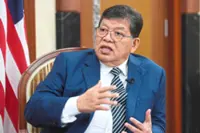Necessary discourse on government policies should take place at higher institute of learning.
EVENTS at the International Islamic University Malaysia (IIUM) framed the week of June 20.
Already a subscriber? Log in
The Star Festive Promo: Get 35% OFF Digital Access
Cancel anytime. Ad-free. Unlimited access with perks.
Follow us on our official WhatsApp channel for breaking news alerts and key updates!
Thank you for your report!






